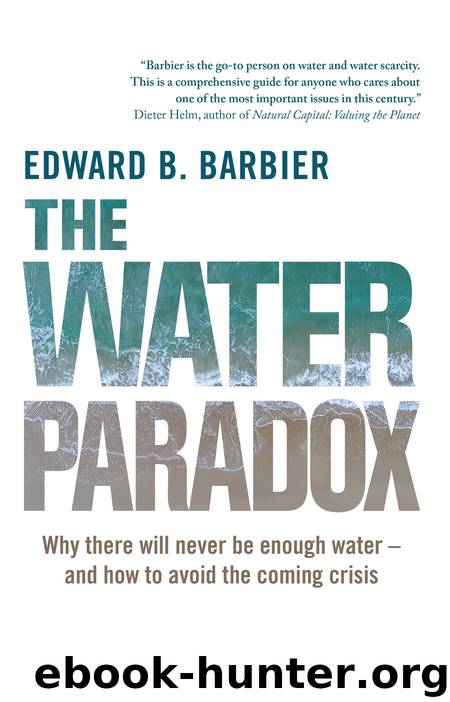The Water Paradox by Ed Barbier

Author:Ed Barbier
Language: eng
Format: epub
ISBN: 9780300240573
Publisher: Yale University Press
Two of the more promising uses of water banks are by the city of Santa Fe, New Mexico, and the state of Arizona.22 In 2005, the Santa Fe City Council required developers to tender sufficient water rights to cover the amount of water required by any development project in the metropolitan area for commercial, residential, industrial or other purpose. Developers began purchasing rights from farmers, and depositing them in a city-operated water bank. When the developer initiated the construction of the project, then sufficient water rights would have to be withdrawn to cover the water use associated with the project. The costs of acquiring the water needed for additional urban development would therefore be absorbed into the cost of new projects. If the project was stalled or cancelled, the banked water rights could be sold to another developer or water user. Santa Fe also enacted an aggressive water conservation program and adopted tiered water rates that rise on a per-unit basis as city residents consume additional water. The combination of the water banks, conservation program and tiered water rates has reduced water use per person in Santa Fe by 42 percent since 1995.
The western state of Arizona has also been experimenting with water banks, especially to control groundwater use. Arizona allows municipal, industrial and other water users to store water in exchange for credits that they can transfer to other users. A unique feature of the Arizona approach is that it counts water stored underground naturally in aquifers as part of this credit scheme. This approach is facilitated by Arizona laws that restrict the use of groundwater in several of the state’s most important aquifers which, combined with additional statutory and regulatory provisions, allow for the creation and recovery of credits for trade in stored groundwater. Arizona’s water banking of groundwater credits and control of use also facilitates trading of surface water, as water users no longer can resort to “free” groundwater as an alternative to buying and selling water.23 As a result, numerous transactions of surface water and groundwater have occurred between various municipal interests, water providers and private parties.
Download
This site does not store any files on its server. We only index and link to content provided by other sites. Please contact the content providers to delete copyright contents if any and email us, we'll remove relevant links or contents immediately.
The Lonely City by Olivia Laing(4798)
Animal Frequency by Melissa Alvarez(4462)
All Creatures Great and Small by James Herriot(4311)
Walking by Henry David Thoreau(3953)
Exit West by Mohsin Hamid(3823)
Origin Story: A Big History of Everything by David Christian(3687)
COSMOS by Carl Sagan(3618)
How to Read Water: Clues and Patterns from Puddles to the Sea (Natural Navigation) by Tristan Gooley(3466)
Hedgerow by John Wright(3354)
How to Read Nature by Tristan Gooley(3335)
The Inner Life of Animals by Peter Wohlleben(3311)
How to Do Nothing by Jenny Odell(3294)
Project Animal Farm: An Accidental Journey into the Secret World of Farming and the Truth About Our Food by Sonia Faruqi(3212)
Origin Story by David Christian(3195)
Water by Ian Miller(3178)
A Forest Journey by John Perlin(3069)
The Plant Messiah by Carlos Magdalena(2927)
A Wilder Time by William E. Glassley(2858)
Forests: A Very Short Introduction by Jaboury Ghazoul(2836)
